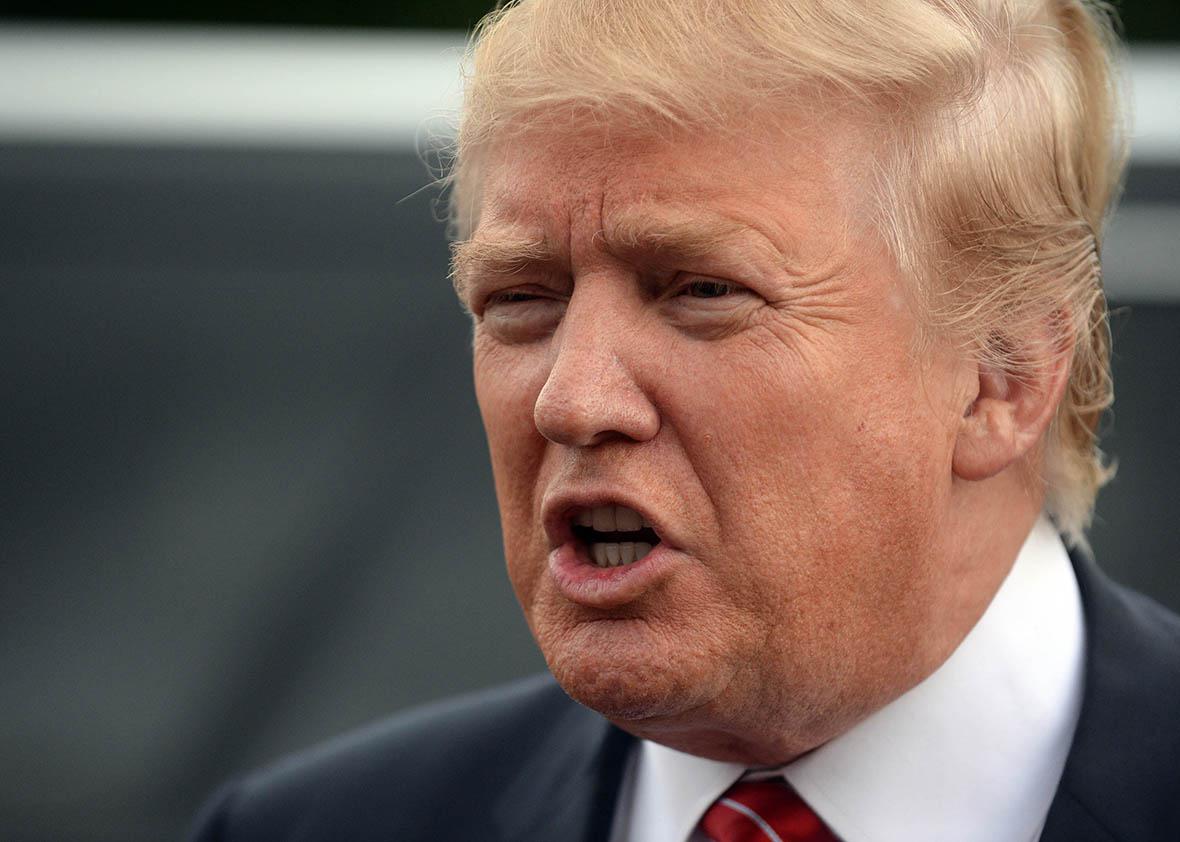All signs point to the nation numbing to Donald Trump’s shtick. His poll numbers are in a holding pattern and his favorability among Republicans is slipping. His pranks aren’t as good as they used to be. He isn’t tossing out entertainingly insane Trumpisms at the pace he used to—or if he is, fewer people are paying attention.
“Mr. Trump’s ability to command both voter and news media attention simply by being his outlandish, bombastic self is starting to wane,” the New York Times reported on Wednesday. The Times points to ebbing social media chatter about Trump’s hijinks as well as a dip in mentions and appearances on conservative talk radio shows.
Trump’s campaign has lived off a strategy of constant free media exposure—something he earned, we should note, by expressing many “newsworthy” opinions that a not-insignificant number of human beings found oddly compelling in a presidential candidate. That’s how he has been able to dominate the race after only spending a couple million dollars of his own money. The problem with Trump’s strategy, though, is he’s created exceedingly high expectations for himself: Unless he keeps upping the ante of bombast, he’s going to see a cratering or even collapse in his media coverage.
Few other humans on the planet understand how to manipulate the media better than Trump, and even he seems to be getting tired of himself. It’s time for Trump 2.0: the stage in which he defines himself on his own terms, instead of performing whatever garish acts are necessary to maintain his outsized share of free media coverage.
That means spending much more of his own money. And how much, really, is he good for?
The Washington Post visited Trump Tower to listen to him outline the long-awaited “second chapter” of his bid, in which he moves “toward a somewhat more traditional campaign.” That means spending money on advertisements and building an organization to get him on the ballot in all 50 states (“an arduous and time-consuming task that has caused some first-time candidates to stumble,” the Post writes. Indeed.) He will also be releasing a book titled Crippled America, which he claims to be editing closely: “I don’t want to have a stupid statement in the book that people are going to say, ‘Hey, why did he say that?’ ” Can you even imagine?
Trump explains his allegedly “more traditional” second act in very first-act fashion. He has contracted a media firm that is “new to politics” to produce his television ads. The first warning sign about what to expect from such a firm is that it is “Florida-based.” The second is that Trump himself “has proposed several concepts for ads in the works.” He’d tell us all about them but that would spoil the surprise. All he would tell the Post is that they’re going to be very classy, very beautiful ads: “I have such a great concept—in fact, so good.” (Funnily, he’s used this “don’t worry about it, I’ve got a plan” message before, though usually for things slightly less frivolous.)
Though Trump’s campaign manager, Corey Lewandowski, says that the campaign is willing to spend “whatever it takes” of Trump’s personal fortune on campaign ads through the year—“considerably more than $20 million,” per the Post—Trump himself has signaled unease with his pledge for costs to come entirely out of his yooge personal resources. That pledge, however, has been a yooge part of his appeal.
He said that he would spend $100 million to capture the nomination but backed off of his plan to spend $1 billion to win the presidency. Instead, according to a Times interview in September, he would “count on the national Republican Party for financial help if he became the nominee.” The RNC has pledged $23 million in hard cash to the nominee. That’s not going to cut it in a modern presidential race. It’s expected that the campaign and groups supporting the nominee will spend billions—for each nominee. (Besides, does he think that the national Republican Party’s money doesn’t come from nefarious special interests that expect favors in return?)
That would leave Trump with a difficult choice should he make it into the general election: Does he back off of his politically potent message not to accept large, corrupting contributions, or does he eat away at—and through—his liquid assets?
Depending on whom you ask, Trump’s liquid assets range from about $70 million to about $350 million. That presents enough trouble to meet even the $100 million figure he’s willing to commit for the primary (which he fantastically claims he will take to a convention floor fight). Whether the figure exceeds his available cash or is “only” one-third of it, that’s a serious amount of money with which to part ways. And it’s nowhere near what he’d need, either for his campaign or in terms of outside commitments, for a general election.
Setting up a campaign infrastructure and a media strategy on your own terms, in which you, the candidate, are allowed to dictate how you present yourself to the public, is expensive. This is why few politicians, even wealthy ones, say outright that they’ll never accept large contributions. Donald Trump did. As with most things Trump, this was an extension of his central message: that he is an extraordinarily rich person. He wouldn’t take donations because he wouldn’t need to. According to him, the “conservative” estimate of his wealth is more than $10 BILLION. The more realistic estimate of Trump’s wealth, in Trump’s mind, is infinity dollars.
At his rallies, Trump has regaled crowds with stories about how he is turning down million-dollar donations from his rich friends. Late in the summer, he began asking crowds if he was stupid for doing so. Would they really be upset with him if he just took the money? If he wants to run his “more traditional” second act without eating deep into his own assets, he will need to start accepting large donations. And then what’s the point?
